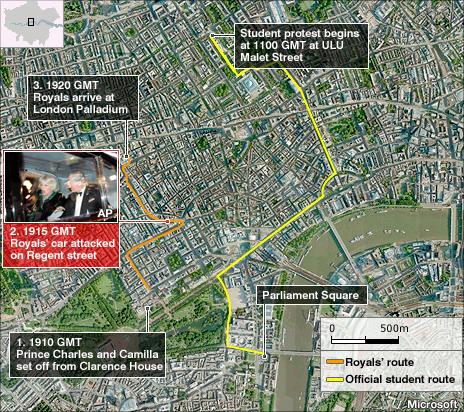Student protests: Radio failure claims rejected
- Published
Amateur footage of the attack on the Rolls-Royce carrying the royal couple
Police have rejected suggestions that a communication breakdown led to the Prince of Wales and Duchess of Cornwall being caught up in student protests.
It has been reported that police guarding the couple were using a different radio frequency to those policing the London demonstrations.
Scotland Yard insisted the two teams were in contact and may have used mobile phones or e-mail.
A major inquiry into the student disorder of recent weeks has begun.
'Intent on violence'
The prince's and the Duchess of Cornwall's car was daubed with paint and had a window smashed during tuition fee protests on Thursday.
The royal couple were being escorted by outriders and Royalty Protection Officers to a theatre in central London when their car was attacked.
A police spokesman said the route along Regent Street had been checked minutes before the incident and was deemed to be safe.
Ex-home secretary Alan Johnson said he was "amazed" by newspaper claims that teams were not fully in touch because protection officers had been so "meticulous" whilst protecting him.
And former Met firearms officer Roger Gray said it may have been more confusing if officers shared the same radio frequency, because there was a risk they could start interrupting each other.
Clarence House, meanwhile, has refused to comment on reports the Duchess was poked with a stick.
The police blame a fast-moving situation on the ground for the security breach, as protesters had been roaming through the West End in small groups, away from the larger protest in Parliament Square.
There were violent clashes on Thursday as MPs voted to allow university tuition fees to rise to up to £9,000 per year in England.
Prime Minister David Cameron condemned the disturbances and Scotland Yard said it had launched a "major criminal investigation" into student disorder between 10 November and 10 December.

But students have criticised police tactics, particularly of holding demonstrators in a small area, known as "kettling".
The Independent Police Complaints Commission is investigating a claim that 20-year-old Middlesex University student Alfie Meadows suffered serious injuries after being hit on the head with a police truncheon.
And protester Jody Mcintyre, who blogs about campaigning issues, claimed police hit him with a baton and twice dragged him out of his wheelchair around Parliament Square.
He told BBC Radio 4's Today programme: "One policeman hit me with his baton on my shoulder and then around four policemen dragged me out of my wheelchair and carried me away against my will."
Michael Chessum, co-founder of the National Campaign Against Fees and Cuts, said the violence in Thursday's protests "overwhelmingly came from the police"
Half an hour later, a policeman who recognised him from the first incident ran over, pushed him out of his wheelchair and dragged him across the road by his arms, he added.
The National Union of Students said there were likely to be more protests as the issues continue to be scrutinised over the coming months.
President Aaron Porter said: "Students are telling me they want to continue to protest. I think we need to find a way to facilitate that, but I also want to do it in a way that doesn't lose public support by allowing those set on violence to take part."
Only 28 Lib Dem MPs - fewer than half - voted for the government's plans for tuition fees. Six Conservative MPs voted against. Three ministerial aides resigned.
The policy will see the basic fee cap rise from £3,290 to £6,000 and universities in England able to charge £9,000 in "exceptional" circumstances.